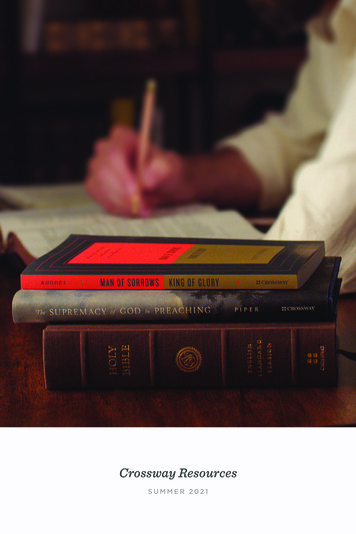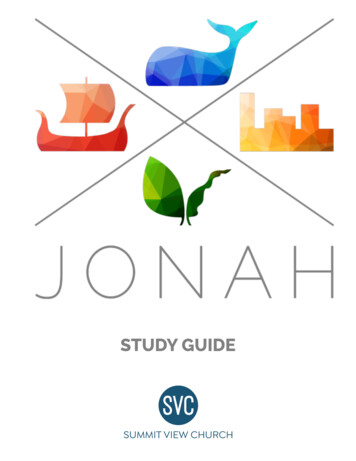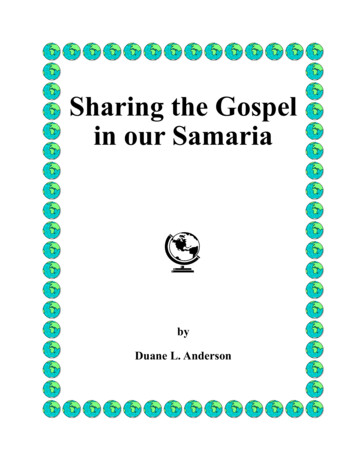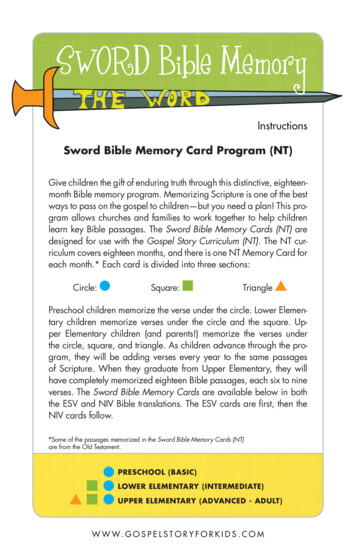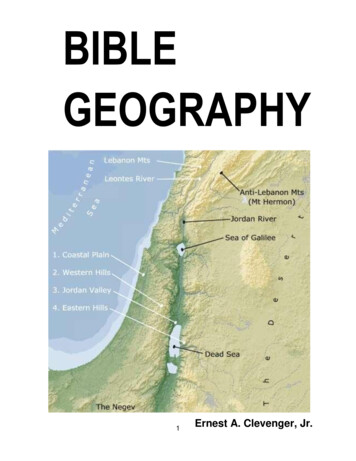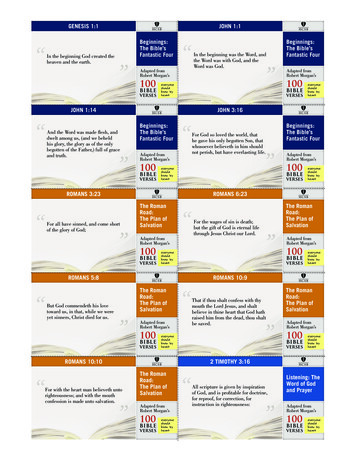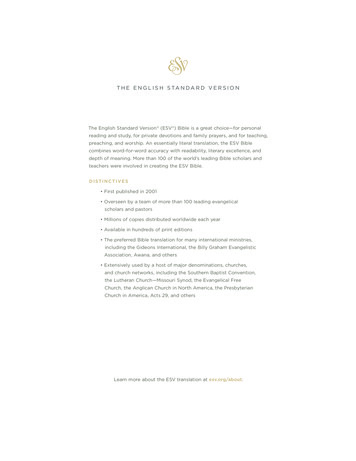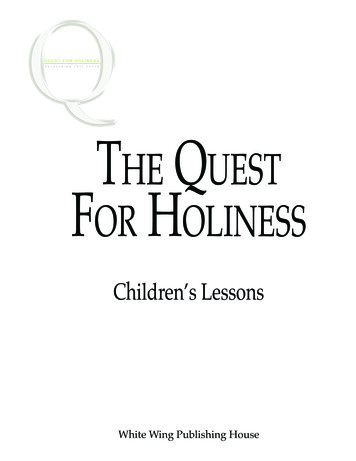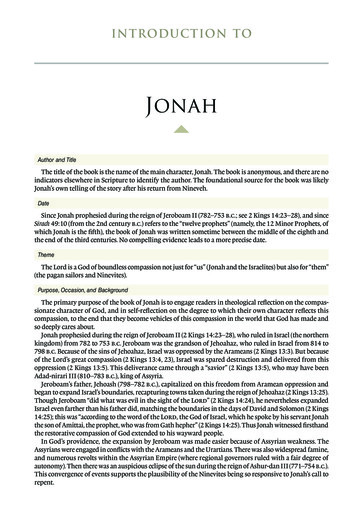
Transcription
Introduction ToJonahAuthor and TitleThe title of the book is the name of the main character, Jonah. The book is anonymous, and there are noindicators elsewhere in Scripture to identify the author. The foundational source for the book was likelyJonah’s own telling of the story after his return from Nineveh.DateSince Jonah prophesied during the reign of Jeroboam II (782–753 b.c.; see 2 Kings 14:23–28), and sinceSirach 49:10 (from the 2nd century b.c.) refers to the “twelve prophets” (namely, the 12 Minor Prophets, ofwhich Jonah is the fifth), the book of Jonah was written sometime between the middle of the eighth andthe end of the third centuries. No compelling evidence leads to a more precise date.ThemeThe Lord is a God of boundless compassion not just for “us” (Jonah and the Israelites) but also for “them”(the pagan sailors and Ninevites).Purpose, Occasion, and BackgroundThe primary purpose of the book of Jonah is to engage readers in theological reflection on the compassionate character of God, and in self-reflection on the degree to which their own character reflects thiscompassion, to the end that they become vehicles of this compassion in the world that God has made andso deeply cares about.Jonah prophesied during the reign of Jeroboam II (2 Kings 14:23–28), who ruled in Israel (the northernkingdom) from 782 to 753 b.c. Jeroboam was the grandson of Jehoahaz, who ruled in Israel from 814 to798 b.c. Because of the sins of Jehoahaz, Israel was oppressed by the Arameans (2 Kings 13:3). But becauseof the Lord’s great compassion (2 Kings 13:4, 23), Israel was spared destruction and delivered from thisoppression (2 Kings 13:5). This deliverance came through a “savior” (2 Kings 13:5), who may have beenAdad-nirari III (810–783 b.c.), king of Assyria.Jeroboam’s father, Jehoash (798–782 b.c.), capitalized on this freedom from Aramean oppression andbegan to expand Israel’s boundaries, recapturing towns taken during the reign of Jehoahaz (2 Kings 13:25).Though Jeroboam “did what was evil in the sight of the Lord” (2 Kings 14:24), he nevertheless expandedIsrael even farther than his father did, matching the boundaries in the days of David and Solomon (2 Kings14:25); this was “according to the word of the Lord, the God of Israel, which he spoke by his servant Jonahthe son of Amittai, the prophet, who was from Gath hepher” (2 Kings 14:25). Thus Jonah witnessed firsthandthe restorative compassion of God extended to his wayward people.In God’s providence, the expansion by Jeroboam was made easier because of Assyrian weakness. TheAssyrians were engaged in conflicts with the Arameans and the Urartians. There was also widespread famine,and numerous revolts within the Assyrian Empire (where regional governors ruled with a fair degree ofautonomy). Then there was an auspicious eclipse of the sun during the reign of Ashur-dan III (771–754 b.c.).This convergence of events supports the plausibility of the Ninevites being so responsive to Jonah’s call torepent.
Introduction to Jonah16 8 4It was not until some years later that Tiglath-pileser (745–727 b.c.) would gain control and reestablishAssyrian dominance in the area, and his son Shalmaneser V (727–722) was the king responsible for theconquest of Israel and the destruction of Samaria in 722. Thus Jonah prophesied in an era when Assyriawas not an immediate threat to Israel and when Israel enjoyed peace and prosperity because of the compassion of God.GenreThe genre of Jonah is debated. The book has been read as an allegory, using fictional figures to symbolizesome other reality. According to this interpretation, Jonah is a symbol of Israel in its refusal to carry outGod’s mission to the nations. The primary argument against this view is that Jonah is clearly presented asa historical and not a fictional figure (see the specific historical and geographical details in 1:1–3; 3:2–10;4:11; cf. also 2 Kings 14:25). Another proposal is that the book is a parable to teach believers not to be likeJonah. Like allegories, parables are also based on fictional and not historical characters. Parables, however,are typically simple tales that make a single point, whereas the book of Jonah is quite complex and teachesa multiplicity of themes.The book of Jonah has all the marks of a prophetic narrative, like those about Elijah and Elisha found in1 Kings, which set out to report actual historical events. The phrase that opens the book (“the word of theLord came to”) is also at the beginning of the first two stories told about Elijah (1 Kings 17:2, 8) and is usedin other prophetic narratives as well (e.g., 1 Sam. 15:10; 2 Sam. 7:4). Just as the Elijah and Elisha narrativescontain extraordinary events, like ravens providing bread and meat for the prophet (1 Kings 17:6), so doesthe book of Jonah, as when the fish “provides transportation” for the prophet. In fact, the story of Jonah isso much like the stories about Elijah and Elisha that one would hardly think it odd if the story of Jonahwere embedded in 2 Kings right after Jonah’s prophetic words about the expansion of the kingdom. Thestory of Jonah is thus presented as historical, like the other prophetic narratives.There are additional arguments for the historical nature of the book of Jonah. It is difficult to say thatthe story teaches God’s sovereignty over the creation if God did not in fact “appoint” the fish (1:17), theplant (4:6), the worm (4:7), and the east wind (4:8) to do his will. Jesus, moreover, treated the story as historical when he used elements of the story as analogies for other historical events (see Matt. 12:40–41). This isespecially clear when Jesus declared that “the men of Nineveh will rise up at the judgment with this generation and condemn it, for they repented at the preaching of Jonah” (Matt. 12:41).The story of Jonah is not, however, history for history’s sake. The book is clearly didactic (as the allegoricaland parabolic interpretations rightly affirm); that is, the story is told to teach the reader key lessons. The didacticcharacter of the book shines through in the repeated use of questions, 11 out of 14 being addressed toJonah, and the question that closes the narrative leaves readers asking themselves how they will respondto the story.Key ThemesThe primary theme in Jonah is that God’s compassion is boundless, not limited just to “us” but alsoavailable for “them.” This is clear from the flow of the story and its conclusion: (1) Jonah is the object ofGod’s compassion throughout the book, and the pagan sailors and pagan Ninevites are also the benefactorsof this compassion. (2) The story ends with the question, “Should I not pity Nineveh . . . ?” (4:11). Tied tothis theological teaching is the anthropological question, Do readers of the story have hearts that are likethe heart of God? While Jonah was concerned about a plant that “perished” (4:10), he showed no suchconcern for the Ninevites. Conversely, the pagan sailors (1:14), their captain (1:6), and the king of Nineveh(3:9) all showed concern that human beings, including Jonah, not “perish.”Several other major themes in the book include:1. God’s sovereign control over events on the earth2. God’s determination to get his message to the nations3. The need for repentance from sin in general4. The need for repentance from self-centeredness and hypocrisy in particular5. The full assurance that God will relent when people repent.History of Salvation SummaryJonah’s rescue from death provides an analogy for the resurrection of Christ (Matt. 12:39–40). The repentance of the Ninevites anticipates the wide-scale repentance of Gentiles in the messianic era (Matt. 28:18–20;
Introduction to Jonah16 85 Gordion TarsusArpadCarchemish Nineveh EcbatanaAsshurHamath Damascus SusaBabylonTyre Samaria Joppa Jerusalem Ur Dumah 0Memphis 0200200400The Setting of Jonahc. 760 B.C.Jonah prophesied during the politically prosperoustime of Jeroboam II of Israel (2 Kings 14:23–28).During this time the Assyrians were occupied withmatters elsewhere in the empire, allowingJeroboam II to capture much of Syria for Israel. TheLord called Jonah to go to the great Assyrian cityof Nineveh to pronounce judgment upon it. Jonahattempted to escape the Lord’s calling by sailingfrom the seaport of Joppa to Tarshish, which wasprobably in the western Mediterranean. Eventuallyhe obeyed the Lord and traveled overland toNineveh at the heart of the Assyrian Empire.400 mi600 kmLuke 24:47). (For an explanation of the “History of Salvation,” see the Overview of the Bible, pp. 23–26. Seealso History of Salvation in the Old Testament: Preparing the Way for Christ, pp. 2635–2662.)map.32-1.indd 46/25/08 5:52:54 PMLiterary FeaturesThe book of Jonah is a literary masterpiece. While the story line is so simple that children follow it readily,the story is marked by as high a degree of literary sophistication as any book in the Hebrew Bible. The500600 Milesauthor employs structure, humor, hyperbole, irony, double entendre, and literary figures like merism tocommunicate his message with great rhetorical power. The first example of this sophistication is seen in0 800 900 Kmthe outline of the book (see below).The main category for the book is satire—the exposure of human vice or folly. The four elements of satire500600 Milestake the following form in the book of Jonah: (1) the object of attack is Jonah and what he represents—abigotry and ethnocentrism that regarded God as the exclusive property of the believing community (in the0 800 900 KmOT, the nation of Israel); (2) the satiric vehicle is narrative or story; (3) the satiric norm or standard by whichJonah’s bad attitudes are judged is the character of God, who is portrayed as a God of universal mercy, whosemercy is not limited by national boundaries; (4) the satiric tone is laughing, with Jonah emerging as a laughable figure—someone who runs away from God and is caught by a fish, and as a childish and poutingprophet who prefers death over life without his shade tree.Three stylistic techniques are especially important. (1) The giantesque motif—the motif of the unexpectedly large (e.g., the magnitude of the task assigned to Jonah, of the fish that swallows him, and of therepentance that Jonah’s eight-word sermon accomplishes). (2) A pervasive irony (e.g., the ironic discrepancybetween Jonah’s prophetic vocation and his ignominious behavior, and the ironic impossibility of fleeingfrom the presence of God). (3) Humor, as Jonah’s behavior is not only ignominious but also ridiculous.OutlineThe story of Jonah unfolds in seven episodes (see diagram, p. 1686):A. Jonah’s commissioning and flight (1:1–3)B. Jonah and the pagan sailors (1:4–16)C. Jonah’s grateful prayer (1:17–2:10)A'. Jonah’s recommissioning and compliance (3:1–3a)B'. Jonah and the pagan Ninevites (3:3b–10)C'. Jonah’s angry prayer (4:1–4)D. Jonah’s lesson about compassion (4:5–11)
Introduction to Jonah16 8 6The first three episodes are paralleled by the second three. By this paralleling the author invites the readerto make a number of comparisons and contrasts, which will be drawn out in the notes. The final episodeis unparalleled and thus stands out as the climax of the story, ending with the penetrating question, “Andshould not I pity Nineveh, that great city, in which there are more than 120,000 persons who do not knowtheir right hand from their left, and also much cattle?”Seven Episodes in Jonah(7) Jonah’s lesson about compassion (4:5–11)“ Should not I pity Nineveh . . . ?”(3) Jonah’s grateful prayer (1:17–2:10)How does Jonah respond to God’sgrace toward him?(2) Jonah and the pagan sailors (1:4–16)How responsive are the pagan sailors?(1) Jonah’s commissioning and flight (1:1–3)What will happen to Jonah?diagram.32-1.indd 3(6) Jonah’s angry prayer (4:1–4)How does Jonah respond to God’sgrace toward others?(5) Jonah and the pagan Ninevites (3:3b–10)How responsive are the pagan Ninevites?(4) Jonah’s recommissioning and compliance (3:1–3a)What will happen to the Ninevites?7/11/08 1:34:30 PM
JonahChapter 11a 2 Kgs. 14:252b Gen. 10:11, 12; 2 Kgs.19:36; Nah. 1:1; Zeph.2:13; Matt. 12:41; Luke11:30, 32 c ch. 3:3; 4:11dRev. 18:53e ch. 4:2 f See 1 Kgs. 10:22gSee Josh. 19:46 h Gen.4:16; [Ps. 139:9, 10]4i [Ps. 107:25] j 1 Kgs.22:48; Ps. 48:75k [Ps. 107:28] l [Acts27:18, 19, 38]6k [See ver. 5 above] m [ch.3:9]7n [Judg. 20:9]Jonah Flees the Presence of the L ordthe word of the Lord came to Jonah the son of Amittai, saying, “Arise, go to1 NowNineveh, that great city, and call out against it, for their evil has come up beforeabc2d1me.” 3 But Jonah e rose to flee to f Tarshish from the presence of the Lord. He went downto g Joppa and found a ship going to f Tarshish. So he paid the fare and went on board, togo with them to f Tarshish, h away from the presence of the Lord.4 But i the Lord hurled a great wind upon the sea, and there was a mighty tempest on thesea, so that the ship threatened j to break up. 5 Then the mariners were afraid, and k each criedout to his god. And l they hurled the cargo that was in the ship into the sea to lighten it forthem. But Jonah had gone down into the inner part of the ship and had lain down and wasfast asleep. 6 So the captain came and said to him, “What do you mean, you sleeper? Arise, kcallout to your god! m Perhaps the god will give a thought to us, that we may not perish.”Jonah Is Thrown into the Sea7 And they said to one another, “Come, let us n cast lots, that we may know on whoseaccount this evil has come upon us.” So they cast lots, and the lot fell on Jonah. 8 Then they1 The same Hebrew word can mean evil or disaster, depending on the context; so throughout Jonah1:1–3 Jonah’s Commissioning and Flight. This episode records Jonah’scall to prophesy and his flight from that call. Two questions drive theplot: (1) What will happen to the Ninevites? and (2) What will happento Jonah? (See diagram, p. 1686.)1:1 Jonah prophesied prosperity for Israel during the reign of Jeroboam II(2 Kings 14:23–28). Jonah means “dove,” a symbol for Israel as silly andsenseless (Hos. 7:11); Jonah will be true to his name. Son of Amittai means“son of my faithfulness”; Jonah will remain the object of God’s faithful love.1:2 Nineveh sat on the east bank of the Tigris River about 220 miles (354 km)north of present-day Baghdad and over 500 miles (805 km) northeast of Israel.***JONAH, CHART 1***Occurrences of the key word (ra‘ah;“evil” / “disaster” / “discomfort”) in Jonah1:2The Lord confronts Jonah with the evil of the city Nineveh.1:7The sailors decide to cast lots to find the source of the evilthey experience.1:8The sailors confront Jonah, wondering why evil has comeupon them.3:8The Ninevite king calls for inhabitants of the city to turn fromevil.3:10God sees the city turn from evil, and he relents from thedisaster he was sending.4:1God’s gracious response to Nineveh displeased Jonah greatly.4:2Jonah’s anger arises from the fact that God relents fromdisaster.4:6The Lord appoints a plant to save Jonah from his discomfort.Great (Hb. gadol ) is used 14 times in Jonah. Nineveh was an important(“great”) city (see 3:3). evil. As the esv footnote indicates, the same Hebrewterm (Hb. ra‘ah; used 9 times in Jonah [see chart to the left]) can mean “evil”or “disaster.” The Ninevites were evil, and they were in line for disaster.1:3 To Tarshish is repeated three times in this verse to underscore that Jonahis not going to Nineveh. Tarshish, an unknown locale associated with distantcoastlands, was somewhere in the western Mediterranean—the oppositedirection from Nineveh. From the presence of the Lord is repeated at theend of this verse to underscore Jonah’s purpose in going to Tarshish. Wentdown (see also v. 5; 2:6; the same verb is used for went on board) is alsoa euphemism for death (e.g., Gen. 37:35). The suggestion is that each stepaway from the presence of the Lord is one step closer to “going down” todeath (see notes on Jonah 1:5; 2:6).1:4–16 Jonah and the Pagan Sailors. This episode highlights Jonah’sencounter with pagan sailors and raises the question, Who fears theLord—Jonah or the pagans? The key repeated word is “fear”: at thebeginning and end the sailors “fear” (vv. 5, 16); in the middle Jonahclaims to “fear” the Lord (v. 9) while the sailors actually fear (v. 10a).1:4–5 Hurled is used four times in this episode (vv. 4, 5, 12, 15). Just asGod hurled the great wind, the sailors hurled the cargo. cried out. The sailorspray, evidently believing that a divine being could come to their aid. had gonedown. In contrast to the sailors, Jonah goes down below deck, taking yetanother step closer to death (see note on v. 3).1:6 Arise, call out echoes God’s commission in v. 2. Ironically, the Israeliteprophet has to be summoned to prayer by a pagan sailor. not perish. “Perish”is repeated in v. 14; 3:9; 4:10. Ironically, a pagan, not Jonah, is concernedthat people not perish.1:7 cast lots. Casting lots was used in the ancient world to discern the divinewill (e.g., Num. 26:55; Josh. 18:6). Israelites believed that God controlledthe outcome (Prov. 16:33). Evil (Hb. ra‘ah) may here suggest “disaster” (seechart to the left).
Jonah 1:916 8 8said to him, “Tell us on whose account this evil has come upon us. What is your occupation?And where do you come from? What is your country? And of what people are you?” 9 Andhe said to them, “I am a Hebrew, and I fear o the Lord, the God of heaven, p who made thesea and the dry land.” 10 Then the men were exceedingly afraid and said to him, “What isthis that you have done!” For the men knew that h he was fleeing from the presence of theLord, because he had told them.11 Then they said to him, “What shall we do to you, that the sea may quiet down forus?” For the sea grew more and more tempestuous. 12 He said to them, “Pick me up andhurl me into the sea; then the sea will quiet down for you, q for I know it is because ofme that this great tempest has come upon you.” 13 Nevertheless, the men rowed hard1 toget back to dry land, but they could not, for the sea grew more and more tempestuousagainst them. 14 Therefore they called out to the Lord, “O Lord, let us not perish for thisman’s life, and r lay not on us innocent blood, s for you, O Lord, have done as it pleasedyou.” 15 So they picked up Jonah and hurled him into the sea, t and the sea ceased from itsraging. 16 Then the men feared the Lord exceedingly, u and they offered a sacrifice to theLord v and made vows.9o Rev. 11:13 p Ps. 146:610h [See ver. 3 above]12q [Josh. 7:20]14r Deut. 21:8 s [Ps. 115:3]15t Ps. 65:7; Luke 8:2416u [Gen. 8:20; 31:54]vSee ch. 2:917w Matt. 12:40; 16:4;[Luke 11:30]Chapter 22x Ps. 3:4; 120:1; Lam.3:55 y Ps. 118:5 z Lam.3:563a Ps. 88:6, 7A Great Fish Swallows Jonah17 2 And the Lord appointed3 a great fish to swallow up Jonah. wAnd Jonah was in thebelly of the fish three days and three nights.Jonah’s PrayerThen Jonah prayed to the Lord his God from the belly of the fish, saying,2“ I called out to the Lord, out of my distress,2xand he answered me;y out of the belly of Sheol I cried,zand you heard my voice.a3For you cast me into the deep,into the heart of the seas,1 Hebrew the men dug in [their oars] 2 Ch 2:1 in Hebrew 3 Or had appointed1:9–10 Hebrew is an ethnic term used to identify Israelites in internationalcontexts (e.g., Gen. 40:15; Ex. 1:19; 1 Sam. 4:6). Jonah claims to fear theLord, but his actions contradict his confession. God of heaven refers tothe universal and supreme God (see Ezra 1:2; Neh. 2:20; Dan. 2:37). madethe sea. Ironically, Jonah confesses to fear the God who controls the sea,which Jonah is crossing to escape from the presence of God (Jonah 1:3). Thesailors who were “afraid” (v. 5) are now exceedingly afraid.1:12–13 hurl. See note on vv. 4–5. rowed hard. It would have been natural for these pagans to hurl Jonah overboard immediately, but they did not.The sea grew more and more tempestuous, for God was not ready tohave Jonah delivered to dry land.1:14–15 called out. Whereas each of the sailors had prayed to his god (v. 5),they now pray to the Lord. The pagan sailors, not Jonah, are concernedthat people not perish (see note on v. 6). Have done as it pleased youechoes the liturgical language of Ps. 115:3 and 135:6, and is thus the sailors’confession of faith in the absolute sovereignty of God. The sailors’ actions arein harmony with God’s: as God had hurled the wind onto the sea (see noteon Jonah 1:4–5) to start the storm, the sailors now hurl Jonah to stop thestorm (see v. 12).1:16 feared the Lord exceedingly. What started as a general fear (v. 5) grewinto an intense fear (v. 10) and matured into the fear—that is, the reverentworship—of the Lord (v. 16). sacrifice . . . vows. The exact response expectedfrom people who fear the Lord (2 Kings 17:32–36; Ps. 22:5; 61:5; 76:11).1:17–2:10 Jonah’s Grateful Prayer. Jonah’s prayer (2:2b–9) is framedby an introduction (1:17–2:2a) and a conclusion (2:10), both of whichmention the “fish.”1:17 appointed. This is the first of four uses of “appoint” that underscoreGod’s sovereign control over creation (cf. 4:6–8). Fish (Hb. dag) is not limitedto what is called “fish” today (generally cold-blooded vertebrate sea creatureswith fins and gills) but is a general word for an aquatic beast, which cannotbe identified further. However, a large whale such as a sperm whale couldeasily swallow a man whole. three days and three nights. Though this maybe a symbolic expression for a time of dying and rising (cf. Hos. 6:2), it morelikely describes the actual number of days, or parts of three days, according toaccepted reckoning of days at that time (cf. 1 Sam. 30:12; 2 Kings 20:5, 8). Ineither case it has associations with return from death or near-death—whichperhaps is why Jesus likened the time between his own death and resurrectionto Jonah’s time in the fish (Matt. 12:40).2:1 Finally, Jonah prayed. He did not pray for God to save the pagan sailors,but he did thank God for saving him.2:2–9 Jonah’s prayer is not a request to be saved from the fish but is thanksgiving for being saved by the fish. Verse 2 summarizes the prayer: Jonahcalled for help and God answered. Verses 3–6a expand on Jonah’s call forhelp; vv. 6b–10 expand on God’s answer.2:2 Sheol refers to the realm of the dead, which one would enter by goingthrough a gate made of “bars” (see v. 6 and Job 17:16; 38:17; Ps. 9:13).Jonah did not literally pray from Sheol but describes his near-death experience (see Ps. 30:2–3).2:3–4 you cast me. Though it was the sailors who had hurled Jonah intothe sea (1:15), he knows that God was working sovereignly through them,and so he can say that God cast him into the sea. Look upon, or “looktoward,” refers to the ancient practice of praying toward the temple (see 2:7;1 Kings 8:30, 35, 38, 42; Dan. 6:10).2:6 I went down (see notes on 1:3; 1:4–5). Jonah’s descent to death isalmost complete as he reaches the roots of the mountains at the bottomof the seas, where the gates of Sheol are located. Since the bars refer to thegates of Sheol (see note on 2:2), the land refers to the realm of the dead (seePs. 63:9; Ezek. 26:20; 32:18, 24), as does pit (see Job 33:22–24; Ps. 49:9;
Jonah 3:416 893b Ps. 42:74c Ps. 31:22 d [1 Kgs.8:35, 38]5e [Lam. 3:54] f Ps. 69:17g [2 Chr. 30:27]8h Ps. 31:6; [2 Kgs. 17:15;Jer. 2:5] i [Jer. 2:13]9 j Ps. 50:14; [Hos. 14:2;Heb. 13:15] k Ps. 3:8Chapter 32l See ch. 1:23l [See ver. 2 above]and the flood surrounded me;b all your waves and your billowspassed over me.c4Then I said, ‘I am driven awayfrom your sight;d yet I shall again lookupon your holy temple.’e5The waters closed in over me f to take my life;the deep surrounded me;weeds were wrapped about my head6 at the roots of the mountains.I went down to the landwhose bars closed upon me forever;yet you brought up my life from the pit,O Lord my God.7 When my life was fainting away,I remembered the Lord,g and my prayer came to you,into your holy temple.h8Those who pay regard to vain idolsiforsake their hope of steadfast love.j9But I with the voice of thanksgivingwill sacrifice to you;what I have vowed I will pay.kSalvation belongs to the Lord!”10And the Lord spoke to the fish, and it vomited Jonah out upon the dry land.Jonah Goes to Ninevehthe word of the Lord came to Jonah the second time, saying, “Arise, go to3 ThenNineveh, that great city, and call out against it the message that I tell you.” So Jonah2l3larose and went to Nineveh, according to the word of the Lord. Now Nineveh was anexceedingly great city,1 three days’ journey in breadth.2 4 Jonah began to go into the city,going a day’s journey. And he called out, “Yet forty days, and Nineveh shall be overthrown!”1 Hebrew a great city to God 2 Or a visit was a three days’ journey103:4). you brought. Jonah had done nothing to deserve being rescued; hissalvation was by grace alone.to the Ninevites and to use Jonah in the process. The message that I tellyou replaces “for their evil has come up before me” (1:2).2:8–9 Those who pay regard to vain idols refers to the pagan sailors,who prayed each to his own god (1:5), but it is also a message to Jonah’s idolatrous fellow Israelites. Ironically, these sailors ended up experiencing God’ssteadfast love, while Jonah ended up in the sea. Sacrifice . . . vowedrecalls the actions of the sailors (1:16), whom Jonah is now like. Salvationbelongs to the Lord is Jonah’s confession that God is the sovereign sourceof salvation, though the rest of the story will show that Jonah believes God isfree to save any, as long as they are “us” and not “them” (see 4:1–4).3:3a Jonah went to Nineveh instead of fleeing to Tarshish. He complies withGod’s will, but whether this compliance is from the heart remains to be seen.2:10 Vomited can express disgust (Job 20:15; Prov. 23:8; 25:16), and someinterpreters see here an indication that God was still displeased with the hostility toward the Ninevites that was still in Jonah’s heart (as revealed in Jonah 4),in spite of the obvious gratitude of his prayer. Nevertheless, the fish’s actionbrought deliverance to Jonah, an indication of God’s favor.3:1–3a Jonah’s Recommissioning and Compliance. The fourth episodeparallels the first (1:1–3) and focuses on the second question raised atthe beginning of the story: “What will happen to the Ninevites?” (seenote on 1:1–3).3:1–2 The second time underscores God’s determination to get his message3:3b–10 Jonah and the Pagan Ninevites. The fifth episode parallels the second (1:4–16) and focuses on how responsive the paganNinevites—like the pagan sailors—are to God’s word. The structurefollows the pattern of corporate repentance found elsewhere in the OT(cf. 1 Sam. 7:3–14; Joel 1–2): (1) message of divine judgment (Jonah3:3a–5); (2) account of human repenting (vv. 6–9); and (3) record ofdivine relenting (v. 10).3:3b an exceedingly great city (cf. esv footnote, “a great city to God”;see 1:2; 3:2). Nineveh is important to God and will be the recipient of hisgreat compassion. three days’ journey in breadth (cf. esv footnote, “a visitwas a three days’ journey”). In Jonah’s day neither the circumference nor thediameter of the walled city of Nineveh (see plan, p. 1691) was a three-daywalk. The phrase may refer to the time it would take Jonah to walk throughoutthe city, preaching his message. (Nineveh could also refer to the much largeradministrative area including the city and the outlying villages, which was30–56 miles/48–90 km across.)3:4 Yet forty days, and Nineveh shall be overthrown! “Overthrown”
Jonah 3:5169 05mAnd the people of Nineveh believed God. n They called for a fast and o put on sackcloth,from the greatest of them to the least of them.The People of Nineveh RepentThe word reached1 the king of Nineveh, and p he arose from his throne, removed hisrobe, covered himself with sackcloth, q and sat in ashes. 7 And he issued a proclamation andpublished through Nineveh, r “By the decree of the king and his nobles: Let neither mannor s beast, herd nor flock, taste anything. Let them not feed or drink water, 8 but let manand s beast be covered with sackcloth, and let them call out mightily to God. t Let everyoneturn from his evil way and from u the violence that is in his hands. 9 v Who knows? God mayturn and relent w and turn from his fierce anger, so that we may not perish.”10 When God saw what they did, x how they turned from their evil way, x God relented ofthe disaster that he had said he would do to them, and he did not do it.65m [Matt. 12:41; Luke11:32] n See 2 Chr. 20:3oSee 2 Sam. 3:316p [Job 1:20; Ezek. 26:16]qJob 2:87r [Dan. 6:26] s [ch. 4:11;Ps. 36:6; Joel 1:18, 20]8s [See ver. 7 above] t Jer.18:11; 36:3 u Isa. 59:69v 2 Sam. 12:22; Joel 2:14wPs. 85:310x [Jer. 18:8]Chapter 41y [ver. 4, 9]2z ch. 1:3 a See Joel 2:133b [1 Kgs. 19:4] c [Eccles.7:1]4d [ver. 1, 9]5e [Neh. 8:15]Jonah’s Anger and the L ord’s CompassionBut it displeased Jonah exceedingly, and he was angry. And he prayed to the Lord4and said, “O Lord, is not this what I said when I was yet in my country? That is why Imade haste to flee to Tarshish; for I knew that you are a gracious God and merciful, slow2y2zato anger and abounding in steadfast love, and a relenting from disaster. 3 b Therefore now,O Lord, please take my life from me, c for it is better for me to die than to live.” 4 And theLord said, d “Do you do well to be angry?”5 Jonah went out of the city and sat to the east of the city and e made a booth for himselfthere. He sat under it in the shade, till he should see what would become of the city. 6 Nowthe Lord God appointed a plant1 and made it come up over Jonah, that it might be a shade1 Or had reached 2 Hebrew it was exceedingly evil to Jonahis the same verb used for God’s destruction of Sodom and Gomorrah (Gen.19:21, 25, 29). Although the threat sounds
Luke 24:47). (For an explanation of the "History of Salvation," see the Overview of the Bible, pp. 23-26. See also History of Salvation in the Old Testament: Preparing the Way for Christ, pp. 2635-2662.) Literary Features The book of Jonah is a literary masterpiece. While the story line is so simple that children follow it readily,
